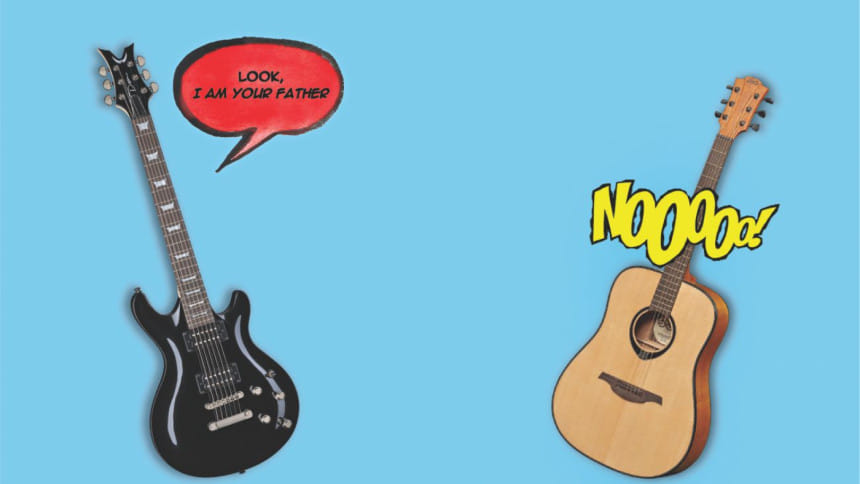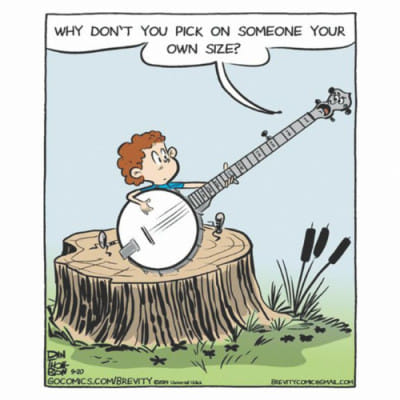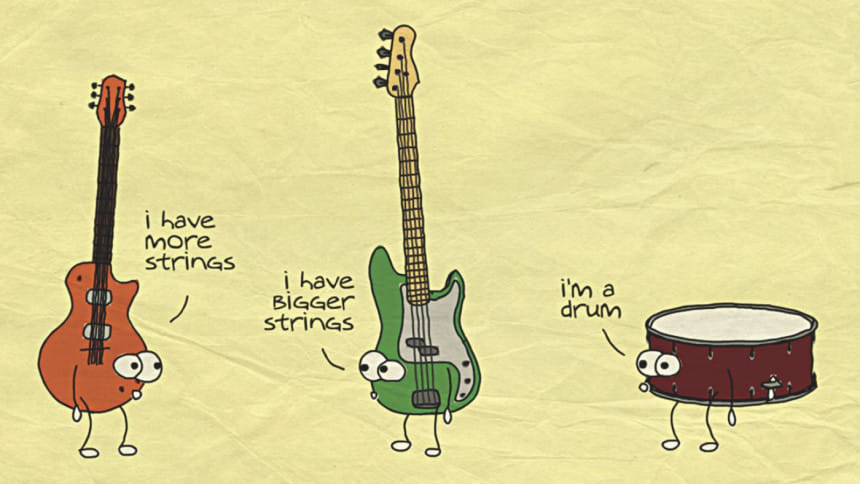When musical instruments talk

It's late on a Friday evening. All you want to do is get back home. You were told there would be kacchi – your greatest weakness, as well as your first love. Nothing can hold you back with kacchi on the horizon. Very soon, however, you lose your sense of direction (as if you ever had it). You're lost in an unfamiliar elaka, where the streetlights don't shine. No, literally – someone has stolen the light bulbs from the pole. You regret spending all of your mobile data looking at memes, because now Google Maps won't load.
As you frantically attempt to navigate through the labyrinthine alleyways, you stop in your tracks. Here, in the middle of nowhere, is the last thing you'd expect: a music shop. The signboard says "Vai Vai Music". You're still trying to figure out whether the name is a pun or a misspelling when the front door swings – no, creaks – open. Guess there's only one thing to do now.
Stepping in, you can smell it. The quintessential music shop smell, the scent of instruments waiting to be played. You shift your gaze to the sagely old man at the counter. With his wild grey beard and grey fedora, he looks ready to share his infinite wisdom with you. Instead, he just gives you a scowl and reminds you of the universal law: "you break it, you buy it".
Caught up in the atmosphere of the place, you wander the aisles. Putting kacchi out of your mind for once, you take a look at the second-hand instruments for sale. Suddenly, you hear a voice call out, and it's not the shopkeeper.

Turning around, you see a dusty acoustic guitar hanging on the wall. "Are you here to adopt any of us?" Yes, the guitar spoke to you. Once you manage to regain your voice, you respond in the negative. "It's just as well; you'd probably just leave me like all my other owners."
Despite the attempt to hide it, there's definitely a deep melancholy in its voice. Curiosity gets the better of you, and you take a seat as you ask it to tell you more (thank God the chairs here aren't sentient as well). "Every time someone takes me home with them, I make the same mistakes. I trust again, and allow myself to fall in love. I never realise that the feelings are always, always one-sided. At first it's always sweet. They play me every day, spending hours trying to learn chords and licks. They put my needs first, and always ensure I'm properly tuned. Then, inevitably, they start to lose interest. At first it's the small things, like not wiping the dust off my body or not making sure I'm back in my case when they're done.
Then it gets bad. The lessons stop, and so does the practicing. My strings rust from disuse and they don't even notice. I always remain out of tune. Eventually they pass me on and I sit in a shop like this, waiting to do it all over again." Its voice breaks at the end and it starts weeping. You realise it probably wants to be alone now. Nothing you say could make this any better, so you just move on.
As you try not to feel sympathy for the acoustic (because let's face it, it is just an instrument), you come across a small alcove on the wall. Perched on that is a worn-looking harmonium. In a deep voice, it speaks: "Do you – oh never mind, you're not a parent." When inquired why it matters if you're a parent or not, it replies: "Oh, it's only parents that buy me. I mean come on, have you ever seen a kid walking into a shop wanting to buy a harmonium?"

Without waiting for a response, it goes on: "Hah, that's what I thought. The truth is, no one ever wants me. I heard you talking to the acoustic. It always moans about how no one stays, but at least someone has loved her, even for a little while. I would do anything to have that. No one ever loved me; their parents just forced us together and expected it to work. They never had any enthusiasm when playing me, and every note felt like a chore. I'd cry myself to sleep just thinking about how listlessly they pulled the bellows.
"In the end I'd much rather have a broken heart than be in a loveless marriage." As you try to come up with a response to all that information, it interjects, "You don't have to say anything. I'm not upset about it. That's just the way things are, that's how I was made and I don't expect things to change anytime soon." Realising that it is an instrument that has lost all hope, you say you goodbyes and move on.
You're starting to develop a soft spot for these instruments, now that you start to realise what they go through. You resolve to talk to a few more and hear of their troubles. You see a beautiful Fender electric guitar on a stand. As you approach it, however, it hisses: "Get the hell away from here, human! You're not wanted."
Shocked and a little taken aback, you step away wondering what you've done to anger it. That's when the harmonium chipped in: "Oh don't worry about the electric, it does that with everyone. It's a shame too. It used to love people like the acoustic does, but then it started going through the old cycle. The same old idiots, all taking it home because it was "cool" to play an electric.
"None of them knew what they were doing; all they succeeded in doing was making a whole lot of noise. Electric was made to play beautiful harmonies – I mean have you heard Mark Knopfler? Yet people didn't give two craps. They were so focused on its looks, no one realised there was more to it. It could have done great things but now it was just a trophy hanging by the straps.
Eventually they just passed it on to the next person, to destroy its self-worth all over again. This cycle took a toll on it, and it grew to dislike all humans. Just leave her alone."

Right about now you start to regret wanting to socialise with these instruments. This was all too much for one evening, so you head for the door. Right beside it, however, is an aging, dusty drum kit. All parts seem intact, but they seem pretty banged up. You figure you can stay a little bit longer, and perch on the seat to speak to the kit.
Immediately something yells out from below you, "Who's there?" It seems the seat that comes with the drum kit is, in fact, sentient. You start to apologise when it cuts you off, "No need to apologise, no need to apologise. You just surprised me, that's all. Please, have a seat."
You carefully perch yourself on the slender platform and it continues. "So, what brings you here?" You reply that you just happened to find the shop. "That's great, we could always use a few visitors around here haha." The drum kit seems strangely cheerful, which is at odds with the rest of the instruments here. You say so, and the drum kit laughs (a little embarrassed, if you ask me). "Yes well, the others have all seen some tough times and some heartbreak. I've been lucky enough to find a friend who loved me. He was the sweetest, and the beats we made were incredible.

"He never shied away from practice, dusted me off and kept me clean, replaced parts when I started to rust – essentially did everything you could ever want. His rhythm was also impeccable. My bass has never been as regular as it was with him."
Happy for the kit, you ask where he is now. "Oh, now he plays in a band. A big one too. They do live concerts at all these major locations, it makes me so happy. Unfortunately, I'm only a beginner drum kit, so he could never reach his full potential with me." You notice it doesn't seem too sad about it. When you say so, its joyful disposition returns. "Of course I'm sad. I loved him, and I hated to see him go. But it's not always about me. It was in his best interests to move on. If you really love someone, you need to do what's best for them and learn to let go." That is wonderful advice, from a drum kit no less. You thank it for taking the time to talk to you, and start for the entrance. The counter's empty, so you can't even say goodbye to the attendant before leaving.
As you exit through the creaky doorway, you turn around to take a last look at the instruments. Instead, you come face to face with a brick wall. There's a solid brick wall where the shop used to be. You stand scratching your head as you try to piece together the occurrences of the evening. Your mind is far too clouded to come up with the answers, so you give up and move along. As you begin walking home, you smile to yourself as you realise this is the first time kacchi wouldn't be the highlight of your day.
Wasique Hasan just bought an electric guitar, so you know what that means. Tell him to treat it well and not just keep it as a trophy at facebook.com/hasique.wasan

 For all latest news, follow The Daily Star's Google News channel.
For all latest news, follow The Daily Star's Google News channel. 



Comments